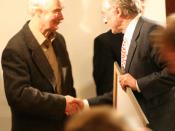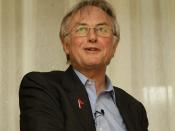One definition of death is the ÃÂthe complete and permanent cessation of all vital functions in a living creature, the end if lifeÃÂ. All philosophers agree that our earthly life in our physical form will end; however philosophers disagree on the meaning of ÃÂend of lifeÃÂ as many people agree on death as the end of our existence however while others argue that we continue in some form after death. Many ideas relating to our existence after death include; the continuation of our genes thought our descendants, immortality of the soul, resurrection of the body, reincarnation and the idea that we live on in memories of others. Many religious beliefs are based on the idea that humans possess a "soul" or "spirit" which exists independently of the body. The notion of life after death is therefore of central concern to religious believers and it is important to establish what ÃÂsurvivingÃÂ death exactly means.
There are two main theories developed for the meaningful survival after death: materialism and dualism.
Materialism is the theory that our minds are inseparable from our bodies. Materialism is the view that only that which we can come to knowledge of empirically and do not accept the existence of a separate soul as it cannot be verified. It is based on and understanding of the universe that has one substance only, that being material, and generally a belief that the universe is governed by cause and effect. Materialists do not accept separate part to our body called the ÃÂsoulÃÂ; they argue that an individual is living, physical body and nothing more therefore at death, the body dies and with it the whole individual ceases to exist. There are two forms of materialism; soft materialism and hard materialism.
Hard materialists, claim that the only substances are material objects, an individual characteristics are nothing more then physical ones. Any idea is consciousness is nothing more then brain activity. Mind is not separate of body so when the body dies so does the brain. Richard Dawkins rejects any concepts of an immortal soul. There is no soul or consciousness as we are the sum total of our genes. He concentrates of the idea that humans are merely carriers of information and DNA. For Dawkins, the only conceivable theory is that of evolution. We are as we are because of our genetic make up, not the efforts of our soul to guide us towards the realm of ideas each change is due to evolution. There is no soul which continues, there is only the survival of DNA, the function of lifeWhile Dawkins does not deal with the concept of the soul he looks instead at the idea of consciousness. Dawkins addresses this feeling of individuality within each human by arguing that this is because our genes are working together. We cannot perceive ourselves as a colony but as a whole. This working together of our genes is based on the desire for survival of those genes. Dawkins claims that now that the consciousness has evolved, the genesÃÂ need for replication is no longer the driving force behind contemporary evolution. Dawkins suggest that human thinking has gone awry because people tried to find the meanings to life, including the following a religious doctrine that teaches the rewards of paradise. If people rejected notions of an after-life and a God and learnt to reason as scientists, then they would become better humans.
Soft materialists agree that when the body dies so does the brain but they say that consciousness is more than just a brain process. They say that the body can be controlled by the mind as the two are linked but not independent of each other. You have a rational side to you which is a part of the brain process but this still dies when you die. Soft materialists say there is no scientific evidence for a soul therefore you cannot prove or disprove there is a soul, the body is only matter and soul cannot be located. Life relies on the body, if you have no functioning body, then you have no life.
Not all materialists accept that death is the end; instead, some believe that there is life after death. As the physical body cannot be separated from the ÃÂsoulÃÂ mind, there is only one way this could happen and that it is the only body continues after death. This survival would involve the resurrection of the body. Known as the Recreation Theory; this is the belief that the whole body continues after death. John Hick argued that in certain circumstances the dead can exist after death. If an exact replica of them were to appear complete with memories and characteristics. As God is all powerful this recreation of the dead is totally possible although death can destroy us God can recreate us. St Paul also talks about resurrection and about how the body will be raised and transformed into something better, something spiritual i.e. seed into plant. Identity the same but outcome is different.
A problem raised with Hicks replica theory is a basic fundamental question. Is the same ÃÂIÃÂ that existed before death the same as the ÃÂIÃÂ in the replica, in the afterlife. Hick tried to solve the problem by putting forward hypothetical story of John Smith who lived in USA. One day, his friends watched as he disappeared without a trace. At the same moment of his disappearance a replica of Smith appeared in India ÃÂexactly similar in both physical and mental characteristics to the person who disappeared in UAS.ÃÂ Concluding that John Smith died and God re-created John Smith in the next world and this re-created ÃÂJohn SmithÃÂ was the same person.
Vardy challenges Hick. ÃÂWould John Smith be the same person?ÃÂ Hick argues that he would if he thought of himself and others thought of himself as the same person, but is this enough? It is a replica the same person? The biggest critique of Hick is that he doesn't successfully get over the continuity problem. Vardy thinks that there is a break in continuity so much so that the replicated could not be the same person. Bernard Williams argues that HickÃÂs portrayal of an endless life of replications would be a meaningless life. It might prove a boring life.
Dualism is the idea that the mind and body are two separate substances; it is possible to survive death, as the soul disembodies. Human beings consist of both physical bodies and non physical minds and that the mind is the essence of a person. Plato in his book ÃÂThe republicÃÂ talks about the soul and says that it belongs to a reality higher than the body and it is immortal. He says that everything has an existence in the world of forms and the world of forms is a spiritual world of reality. It is only the soul, according to Plato, that can grasp and fully understand the world of ideas. The soul yearns to travel to the world of forms and return back from where it came. Plato believes in the pre-existence of the soul. He suggests that there is a conflict between the body and the mind because the body is concerned about physical needs and the mind is concerned with thinking. The aim of the soul is to brake free from the chains of matter and the body in which we are imprisoned.
Plato used an allegory of an underground cave with an entrance open to the light to explain his distinction between body and soul. In the cave, with their backs to the entrance, is a row of prisoners, with their hands tied down, unable to move, he compared humans to these prisoners. Behind them is a bright fire. People all day and their shadows are projected onto the wall of the cave and voices are echoed. Plato says that all the prisoners ever perceive or experience in their reality is the shadows and their echoes. It would seem reasonable for them to assume that the shadows and echoes constituted all of reality.
BibliographyÃÂAS and A Level Religious Studies: Philosophy and EthicsÃÂPhilosophy of Religion for A Level Second Edition (Paperback) by Anne Jordan, Neil Locker, Edwin TateÃÂEdexcel AS Religious Studies: Student Book (Paperback) by Ms Sarah K Tyler, Mr Gordon Reid, Mr Jon Mayled, Dominique Messent, Gopinder Kaur , Ms Jennifer SmithÃÂExamining Philosophy and Ethics Answers for A Level (Paperback) by Patrick Clarke





